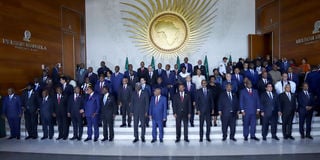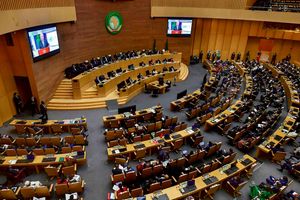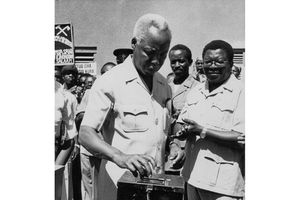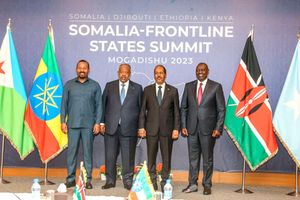
African heads of state pose for a group photo with African Union Commission Chairperson Moussa Faki Mahamat during the opening of the 37th Ordinary session of the Assembly of the Africa Union in Addis Ababa, Ethiopia February 17, 2024.
In the aftermath of the annual summit of African heads of State in Addis Ababa Ethiopia that ended February 18, 2024, the continent’s most crucial agendum is to competitively fill the powerful post of the Chairperson of the African Union Commission (AUC).
Those eying Africa’s most coveted job are expected to apply by the end of April. This will set the stage for shuttle diplomacy and campaigns in the run-up to February 2025 when 55 African heads of State will cast their ballots to pick a new AU CEO to replace the incumbent, Moussa Faki Mahamat of Chad.
In Kenya, it has sparked feverish debate over academic qualifications. According to the AU official website, applicants for the seat must have a Master’s degree in Law, International Relations, Economics, Diplomacy, Management, Business Administration, Political Science, Social Sciences or closely-related fields from a recognised institution. And although a PhD in these fields will be an added advantage, the most decisive but largely unspoken qualification for AUC chairperson is ‘peerage.’
So far, all the past four occupants of the seat have met both the high-pitched academic and peerage criteria. The first Chair, former Mali President Alpha Oumar Konaré (2003-08), was a university professor of history and archaeologist. His successor, Gabon Foreign Minister, Jean Ping has a doctorate in Economics (Doctorat d'Etat, 1957).
Nkosazana Dlamini-Zuma, the first woman to occupy the seat, is an accomplished medical doctor with multiple degrees and diplomas and former South Africa’s foreign minister. The incumbent, is a former Prime Minister of Chad, holding a post-graduate degree in Higher Studies in Public Law.
It must be said that the real trouble with Africa is leadership. Year in year out, the continent has voted in jokers, cranks, weak men and women, and charlatans with the gift of the garb. The continent continues to get the government on the cheap, ending up with cheap governments stalking its political landscape and its best and ablest people out of power.
In 2025, the continent has a date with destiny. Africa has to sort the wheat from the chaff and come up with a ‘philosopher-king’ at its helm to steer it through the tempestuous geopolitics of our multipolar world — and, hopefully, to win the 21st century as the “African Century”.
Only by putting its best and ablest at the helm of continental leadership can Africa gain a stronger and credible voice on the global stage and build its financial strength to fund its own budget, invest in collective security and maximise of its status as the single largest and most influential voting bloc at the UN. Since September 2023, the AU represents Africa as the 21st member of the G20 grouping.
The 2023 Summit ring-fenced the next AU Commission chair for the Africa Eastern region. As such, the onus of bequeathing Africa with a philosopher-king in 2024 falls on the 12 heads of states in the EAC/IGAD belt. Eastern Africa is endowed with six retired presidents, scores of former Vice Presidents, Prime Ministers, and many luminaries and éminence grises who meet the AU yardstick. It has a historic mission to give Africa its ‘Moses.’
Sadly, the region is off for a rocky start. Localised power games risk filling the AU with charlatans, cranks and jokers. In Kenya, a pivotal state in the region, even before the applications are in, a frenzied whirlwind campaign for the AUC chairmanship has ensued. In the peculiar context of Kenya’s internal power dynamics, positions in the African Union have been weaved into the local elite deal-making and power-sharing.
After the 2017 elections, Raila was appointed High Representative for Infrastructure Development in Africa in 2018. Most certainly, this hubris of power will produce Kenya’s candidates for the top AU Commission seat.
Kenya has to be less hubristic and more strategic to put before the Africa heads of state its best and ablest candidate in 2025. A frenzied Kenya-style ‘Soko Mjinga’ campaigns at roadside markets, media and political spaces is a crude tool that is cutting messily. It is just giving Kenyans a bad name as a noisy and arrogant people without humility and with a quire sense of entitlement in a cosmopolitan region. Certainly, the country has no shortage of able and experienced candidates for the powerful AU seat. But they must outshine their many regional peers.
Kenya’s battle for the soul of the AU is mired in the murky and unfinished 2022 electoral matrix. The AUC job is now a new front in a three-way political feud involving the country’s top power elite: Kenyatta, Raila and Ruto.
Kenyatta, like Raila, is reportedly eyeing the AU job. On February 15, 2024, in a high-voltage media campaign actively supported by former Nigeria President Olusegun Obasanjo, Raila formally declared his interest in the job. He has since visited the Herder Institute, his alma mater, to quieten naysayers of his academic credentials.
The battle for the AUC seat is driving a sharp wedge within the ruling UDA party. In Mt Kenya, leaders are publicly questioning why the government has agreed to support Raila over Kenyatta. Rival UDA honchos are accusing Kenyatta of backing Tanzania's Jakaya Kikwete instead of Odinga. Prime Cabinet Secretary Musalia Mudavadi talked about Raila’s bid at a public rally in Bondo.
As the adage goes, “If it looks like a duck, swims like a duck, and quacks like a duck, then it probably is a duck”. The battle for the AUC has the making of another ‘handshake’. The Ruto men see a power-deal with Raila as a sure way to ensure his neutrality vis-à-vis local political contests and to ultimately remove him from the 2027 presidential race.
They are dead wrong. In Raila’s words, the AU job is a ‘sabbatical’ not retirement. But are power-games so much ado about nothing? It is official: considering that Ruto is the new AU Champion for Institutional Reform, will Kenya get another top seat? I doubt.
- Prof Peter Kagwanja is the CEO at the Africa Policy Institute, Adjunct Professor University of Nairobi & Visiting Scholar at the National Defence University-Kenya.










